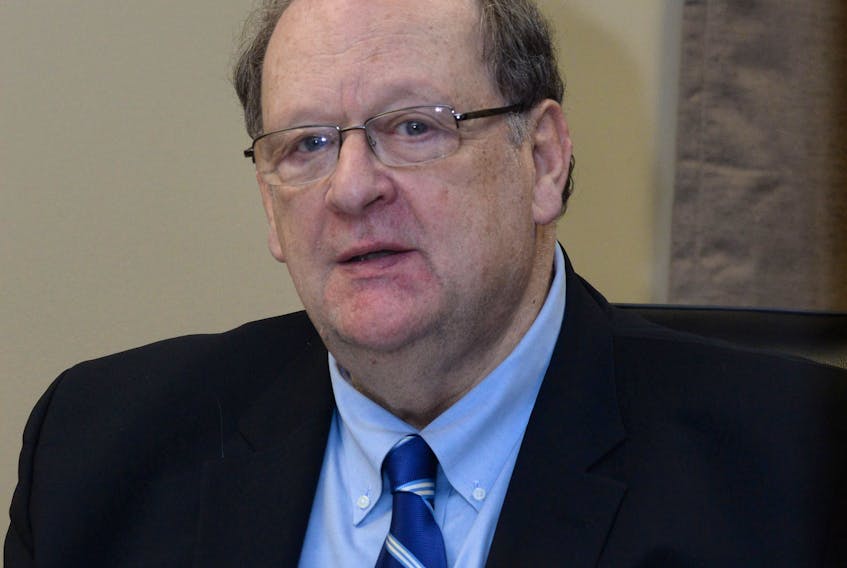Tom Marshall, Finance minister at the time of sanctioning of the Muskrat Falls hydroelectric project and former Newfoundland and Labrador premier, says he knew a trio of individuals in the department had recommended a hold on the project plans for one to two years to allow for further review.
He disagreed.
Marshall was Finance minister from October 2009 to January 2013. It included the time of the final reviews of power development options for Newfoundland, the first agreements for Muskrat Falls and sanctioning at the end of 2012.
Presented at the Muskrat Falls Inquiry on Tuesday with an “information note” written by the three staff members in Finance in January 2012, Marshall said he did recall it.
“They were just letting me have their views,” he said.
On Monday, former Finance deputy minister Terry Paddon had no recollection when presented with the same document. It wasn’t addressed to anyone and there’s no documentary evidence showing who in the government would have seen it.
Marshall specifically recalled asking if the three mid-level individuals who wrote it were interested in meeting to discuss what they had put forward. He testified he was told at the time they were not. And he didn’t agree with their suggestion to delay the project.
The memo referenced possible criticism of the government, as Marshall said on the stand, but he thought that’s not something you can insulate the government from. There were comments on the Public Utilities Board’s (PUB) review of the project versus an “isolated island” alternative, but Marshall said he felt the PUB had the question the province needed answered. And he disagreed with a delay, given his understanding time was actually at issue.
“This all started with us being told there was a need for power and if we didn’t get the power by a certain date there was going to be outages. There were going to be outages, I think, by 2015 at peak times and then there were going to be outages post-2020, 2019, there were going to be outages all the time,” he said.
Marshall said if something wasn’t done and there were outages, such as due to a failing generator at Holyrood, the government would be to blame for blackouts.
It was noted that he and then-Natural Resources minister Shawn Skinner did — along with senior bureaucrats such as Charles Bown and Terry Paddon — support the call for an independent review of project costs and project risks for the government. He testified his understanding was the government opted to make the reference to the PUB, followed by the hiring of Manitoba Hydro International (MHI) for an additional piece of review work, involving the more advanced “decision gate three” cost estimates. He thought that was fair.
He said it would have been helpful, even preferable, to have the PUB review when more advanced estimates were available for the cost and schedule.
“It would have been better to allow the (PUB’s requested) extension, but that was not the decision of the government,” he said, while standing by his role as part of the cabinet in the final decisions made.
Despite his personal reservations and lack of familiarity with the details, Marshall did give a speech in the House of Assembly in November 2012 about the PUB review, saying the PUB’s concerns around the review schedule “were never clearly communicated” and the utility regulator was “unable to do their job.”
It stated the later MHI review work for the government “validated” the hydro megaproject as the least-cost option for power, although the inquiry has been told the consultant did not include things like an estimated $500 million ($497 million specifically) suggested for “strategic risk,” or complete a risk analysis at all, apparently by direction.
Marshall said he wasn’t aware of that, or of the “strategic risk” amount not shared with the public.
A new document entered into evidence was dated Aug. 3, 2012, and titled: “DG3 alignment session.” It is a series of presentation slides on Nalcor Energy letterhead. Among other things, the document includes 11 pages of notes titled “House of Assembly debate.” They address “key messages” and reference a “hit squad” to be active during the debate who were to attack the position of the NDP and Liberals, and raise negatives tied to not pursuing the project.
“I don’t recall that and I don’t think I would have paid much attention to it, quite frankly,” Marshall said of the bullet points.
Marshall was asked by lawyer Dan Simmons, representing Nalcor Energy, if he knew about a “communications committee” that included both government staff and Nalcor Energy representatives. He asked if Marshall could say if the presentation was generated by Nalcor in co-operation with — and at the request of — the government. Marshall said he didn’t know.
Marshall continues on the stand Wednesday and is expected to be followed by Jason Kean, who was a member of Nalcor Energy’s project team.
Related stories:
Finance didn’t review estimates: former Newfoundland and Labrador deputy minister









